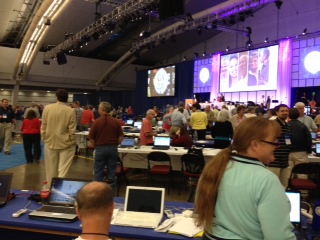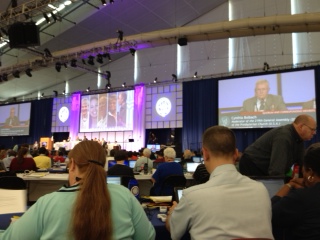The committee itself had taken a lukewarm view of many of the ideas in it. The GA agreed with their view and chose not to try any of the really new ideas, such as non-geographic presbyteries or doing away with synods. Instead, it was agreed to create a commission to try to reduce the number of synods overall, but not to do away with them completely. This move basically meant we didn't shake much of anything up. We know the church is struggling, but we don't want to try anything too scary regarding our organization in order to try to fix it. Although I, too, was worried that some churches might try to form a non-geographic presbytery just because they all agreed on a few theological issues, I though the Commission's recommendations were worth a shot. The recommendation was just to try it until 2020, and if it didn't work, we could go back to the way it used to be. I supported the idea, in part, because the work of the Mid-Council Commission was so thorough and far-reaching, and their results...frankly, terrifying. If we continue to shed members at our current pace, the entire denomination might be out of members in less than 20 years. That is worrisome - not because God really needs a Presbyterian church, but because I believe our tradition offers something unique to the whole body of Christ. And selfishly, because I make my living serving God through it and I would like to continue to do so. This GA decided that we need to try new things, but not things like this.
Middle East issues were the next major topic on the agenda. This was about whether or not our church should divest its monies from 3 companies who operate in the Occupied Territory in Israel/Palestine, and whose business is (perceived by many to be) in violation of human rights. Each morning before the business started, we often heard greetings from ecumenical and interfaith leaders from around the world. Before this vote, a prominent Jewish Rabbi was invited to do a greeting. Unfortunately, he abused his invitation and spent about 10 minutes telling the body why it would be incredibly damaging for Presbyterian/Jewish relations if we voted to divest. Although he is entitled to his opinion, using his greeting to persuade us of it was an inappropriate attempt to sway the vote before we had even had open discussion on the topic. As soon as he got on that topic, I was furious and couldn't understand why the moderator didn't step in to respectfully tell him he needed to stop. Perhaps the moderator was worried about how such an action would be perceived. However, nothing was ever done to rectify the situation or present a similar voice on the other side. Though we were told that a Palestinian had been invited to come to GA, he could not attend because of visa issues. That alone tells us how difficult it is for Palestinians to have freedom of movement. With the stage set, we took up the committee's recommendations which were overwhelmingly in favor of divestment. Most of the arguments remained focused on the Jewish/Presbyterian issues, rather than the actual issues Palestinians face or what our Christian brothers and sisters had asked us to do. Through some challenging parliamentary moves, the main issue on divestment was eventually replaced with a substitute motion to focus on "positive investment" in Palestine. That substitute motion passed (and thereby the plan to divest was defeated). While positive investment sounds really nice, it is impossible to carry out in reality. The church has looked for ways to invest in Palestinian businesses, but there are no major companies able to operate there. Israeli rules and regulations simply won't allow it. The only kind of commerce going on is small arts and crafts and a bit of olive oil production, which is not sufficient to garner the kind of investment folks are seeking to make. In the end, we also agreed to a boycott of a few specific products made in the Occupied Territories, including Ahava cosmetic products and certain dates grown in the region (often marked King Solomon). The market share of these products is so limited however, and since most of us don't buy them anyway, the impact will be relatively insignificant. I was really disappointed about the entire outcome. Money is such a powerful issue in our culture, and agreeing to keep it invested in companies we know are using it in ways that are against our faith seems ultimately unfaithful. I know the actual amounts of money we have in the companies are small, and I know that relations with some Jewish groups might become challenging, but I also believe that Jesus calls us to do the hard things, the unpopular things that also point toward justice. It was agreed to take up the marriage issues at 2pm on Friday. The theory was that if we started this issue "early" enough, we would finish our business on time. Ha! This debate began at 2pm and lasted til 5pm. Then we ended up working until 1:30am on Friday with all the other business, and we still weren't finished. Things continued Saturday, but it was really tough to get through everything before us. My committee's report began with the amendment to the Book of Order that would have changed the definition of marriage to be between two people, rather than between a man and a woman. However, there were two substitute motions that were presented to replace that recommendation. One was a mandate to the church to study issues of marriage, but it recommended a delay in hearing the outcomes of the study for 6 years. Many who were opposed to this study called it just "kicking the can down the road." The other substitute motion sought to strengthen the language in the current BoO regarding one man and one woman. Since I had sat on the committee, I wanted to be able to speak to the motions on the floor. I went to the microphone and began waiting in line right when the report started. The process for speaking is that there are 8 microphones. You check in with the person at each mic, and depending on whether you are speaking for or against the motion, you hold up a green or red paddle. Then you wait to be called on. Sometimes you wait and wait and wait. I stood in line for no less than three hours in order to speak for 60 seconds. The lines at each mic were 10-20 people deep, since this issue was so important. When it was my turn, I recommended approval of the Authoritative Interpretation (see Part 2 for a refresher on this), and spoke about how our international mission partners might respond to a change in our definition of marriage. There is much concern that some global church partner denominations will choose to break communion with us if we do make a change, because they perceive us to be doing something we shouldn't be. However, I spoke with a number of people who said that some global denominations already did this over our change in ordination standards. Though the "official" line is that they are no longer in partnership, many individual presbyteries and churches are still participating in faithful and fruitful ministries, particularly in Ghana and Mexico. I though it was important for people to know that relationships founded in Christ, where actual church members know each other, are not so easily broken over doctrinal or policy differences. My time serving in Africa leads me to believe that relationships are the most important thing. In the end, neither substitute motion was accepted and we still voted on the amendment. The Young Adult Advisory Delegates (whose votes "advise" - they aren't counted in the official total) advised us to approve the change. However, the overall vote was again razor thin, but was in the negative. We then moved on to the groups request for a study (different than the one mentioned above), which was moved to "answer all business." That meant that we would not vote on any of the other overtures - our vote on the study would be the final word on everything. This study was a piece of new business the committee approved. It asked the church to study marriage for a period of two years, so that more discussion could be had a the next GA in 2014. First, many of us tried to pull out the AI so that it could still be voted on separately. I felt this was important and was a way to stop the judicial procedures against pastors. The AI was not pulled out, so the last vote regarding marriage issues was on the study. This passed, so it now falls to US to choose whether or not to study marriage in all its forms and have a deeper conversation on this issue. You are probably worn out reading this. We are all incredibly worn out debating these issues. Truly GA was one of the most exhausting and challenging weeks I've had. I came away feeling disappointed. I felt that the church had a number of opportunities to try new ways of "doing" church, to stand up for justice even when that is risky, and maybe to open ourselves just a little to people who have often been un-loved by the church, the LGBT community. We passed lots of other interesting studies and measures. But I basically felt like we came out with a status quo position. And the status quo is not helping our church find a new identity or serve God in refreshing ways. The PCUSA is still doing plenty of faithful work. But we aren't adjusting to new cultural realities, which means we are being left behind. I know there are lots of reasons why this is the way GA went: fear, worry about a schism in the church, differences in Biblical understanding, fear, disagreements, churches still reeling from new ordination standards and a new form of government, and fear. But the angels of the Lord always come and tell us "Do Not Be Afraid." And that's for all of us: those of us who are afraid the church will stagnate and die, those who are afraid we are becoming too liberal OR too narrow in our reading of the Bible, those who are afraid we will turn off young people if we don't marry gay people, those who are afraid we will divide as a denomination. We simply have to take heart and stop being afraid. Because there is nothing in life or in death that can separate us from the love of God in Christ Jesus our Lord. Period.
2 Comments
|
Archives
February 2022
Categories
All
|
First Presbyterian Church of Warren


 RSS Feed
RSS Feed
